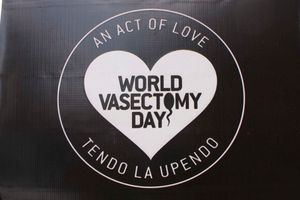
Over 1,000 Kenyan men have undergone vasectomy in the last three years.
“I will ask again, are you sure you want to do this? Are you ready to handle the aftermath?”
“Yes, I have made up my mind. I mean, aside from you injecting my pouches with who knows what, I am ready.”
This is a snippet of an exchange that happened sometime last year between John Juma (not his real name), and Doctor Kelvin Kinuthia, a consultant obstetrician and gynecologist, approximately 10 minutes before a vasectomy procedure.
As Mr Juma remembers, Dr Kinuthia was pleasant and reassuring. His tone had the quality of a friendly bartender checking in on your drink status, or like your friend skiing to your crash site after you’ve tumbled 600 feet down.
As he remembers the day he had the surgery, Mr Juma pauses briefly, then takes a deep breath. The chair he is sitting on squeaks as he leans forward to push the queen piece into attack.
Also Read:Inside Kenya's male fertility crisis
He is in his mid-30s, fresh from finalising his divorce, and has agreed to share intimate details about his decision to have a vasectomy over a game of chess.
Polished and affluent, Juma, who insists we use an alias, is among over 1,000 Kenyan men who have undergone vasectomy in the last three years.
The big question on everyone’s mind, including medics, is this: Why the surge in numbers? Why now?
"If you look at the Kenya Demographic and Health Survey from previous years, there were only about five to 10 vasectomies reported countrywide. But after Covid-19, we began noticing an increase in numbers.
“There were a lot of pregnancies during that period so I think increasingly men began to feel the need to step up and take control over when to have children. But at the same time, during Covid-19 we had so much information on our hands. People were researching more than ever before.
“As to why more men took up vasectomy, it would be hard for me to say. That's every man's decision to make. If I choose to have the procedure, is it because I can't afford more children, or is it that I have enough children? Is it that I don't want my partner to be on other family planning methods? That is a personal decision that only the man can make,” the ob-gyn says.
For many years Dr Kinuthia would perform just one vasectomy in a year, but last year alone he did 20 such surgeries at his Grace Memorial Hospital in Utawala, Nairobi. In January this year, he performed three.
Kenya Economic Survey 2023 revealed that the number of men who underwent vasectomy in 2022 was 557, up from 248 in 2021. In 2020, 334 men were recorded to have undergone sterilisation.
But even with the surge, Dr Kinuthia observes that vasectomy is not for everyone.
“Most people we see are in their late 30s and early 40s. This is not a method that can be used by someone who plans to have more children. It attracts people of a certain age and status in life, and who have a certain number of children. The youngest client I have ever performed this procedure on was in his early 30s."
Dr Kinuthia has had to turn down some clients seeking the service.
“There are patients any doctor will turn away even if they are above 18 years. You might find a young man who has never had children, and whose decision is maybe based on emotions or his current relationship. Most doctors will decline to offer that service because it doesn’t confer any benefit to that patient. It is an ethical decision rather than a moral one,” he says.
For the bubbly Juma, a man with a bold persona who works in the corporate world, several reasons informed his decision.
“When I had my last child in 2018 I figured out I wouldn’t need more. I have enough already. I mean, children are expensive. There is a joke among my peers that school fees is the best contraceptive because the amounts are quite high especially in Nairobi, yet everybody would want to give their children the best education,” says Juma whose children are enrolled in one of the international schools in the city.
“Apart from that, most women seek hormonal contraceptives which are silent killers. A lot of them have died of pulmonary embolism caused by the side effects of these hormonal contraceptives. I have heard stories where some have died in washrooms while on the call of nature. So many things come into play and I concluded that having a vasectomy 100 per cent effective and safe, and would be ideal for me and my wife. However, I had the procedure done after our divorce,” John Juma adds, bursting into a hearty laughter.
Juma, who doesn’t see himself remarrying, describes his divorce as 'a prison break,’ and says he is very open to having a blended family where each partner takes care of their bills without bothering the other.
"I would rather have a life partner now, for companionship. Just good times and vibes and if it doesn't work out, we can always part ways amicably with no hard feelings. After a prison break would you want to go back? Besides, I am fast approaching 40, and I think what I need more at this stage of my life is to travel the world rather than be changing diapers."
I take Juma a step back and ask, “Why did you wait until you were divorced?”
Another round of cheeky laughter follows.
“Well, I still would have done it even while married. It would’ve been nice to have a moment together without having to worry about life-altering consequences again. But you see, even after marriage, life has to go on. I felt I would still need to have some control over my life.”
It is probably easy to see things through Mr Juma’s story. His divorce encouraged him all the more to have the procedure done, but it was his next relationship that made him decide to have the 15-30 minute sterilisation done rather than wait for unwanted surprises.
“I hate to say this, men, but be very careful about who you have children with. When you get divorced a lot of these women will try to go after your fortune. I have seen instances where women have used children to exploit men. I know of one with three baby daddies who all send money monthly for upkeep. When you do the math you realise the woman actually earns more than any of her baby daddies.
“I experienced the same when my ex-wife demanded monthly upkeep of Sh300,000 for our children. It wasn’t making any sense because during our stay together we barely spent beyond Sh100,000 for our house bills every month. Infact, for about five years my ex-wife was jobless. I would foot all the bills but when we got divorced she wanted alimony. I’m glad the court saw the deceit in that. That’s extortion,” Juma says with a dejected tone, the humour now gone.
He says if you get involved intimately with a woman and no children come as a result of your camaraderie, should you part ways, then you can move on swiftly like nothing ever happened.
“A child will always bring some complication when a couple splits. Alimony appears to be the newest lucrative career among some women. This for me was another reason to get sterilised.
“I know of a politician with whom we have had a few benders. He had a ‘vasce’ and was having an affair with some young lady. The woman didn’t know about this and got pregnant. The politician played cool throughout the pregnancy and footed all the needed clinic bills only to go AWOL when the lady delivered. She had to fundraise to foot the humongous bill she accrued at the private hospital. When she attempted to sue for child support, that’s when she learned of mhesh’s little secret,” John Juma lets out another of his signature hearty laughs.
When John had the procedure done, he kept it from his then girlfriend.
“For the three years we were together, there were a lot of red flags that I hoped would fade as we got to know each other better. She so badly wanted us to have our own child but the thing is, many times when I questioned her if she was ready for us to share financial responsibilities, she would say to my face, ‘never!’ Would you risk having a child with someone of such a mindset in the name of love?
When Juma finally revealed the secret to her sometime this year, her ex-partner was gutted and accused him of wasting her life.
“How did I? I don’t think I did her any wrong. She can still have children with someone else, just not me. I am convinced she was setting me up for a trap, luckily I was a step ahead.”
For the few people Juma shared his experience with after the procedure, he noted many concerns especially from his peers.
One friend asked him, “What if you want children again in future?”
In such a situation Mr John argues that he has a plan in place already. He will simple go for a reversal of the procedure. The only challenge is that success rates for such scenarios are low.
“Vasectomy is a terminal procedure that is considered irreversible. However, surgery can be carried out to try to reverse it. The chances of success however are usually less than 10 per cent. When you decide to do a vasectomy just keep this in mind. Besides, you will need about Sh300,000 for the reversal. Compare that with the Sh20,00 or Sh40,000 you will pay for a vasectomy,” says Dr Kinuthia.
Experts in reversal are fewer because the procedure involves micro surgery. A safe net is for those who are unsure of their decision is to invest in a sperm bank.
Did it hurt? Another asked.
“Of course it did, but not as much as you think. The only real pain you feel is when the initial anesthetic is administered. It feels like someone thwacking your private part 100 times with a rubber band. The anesthetic syringes have to go through the soft tissues of your balls, and I will leave that for you to imagine.” Mr Juma says.
But Dr Kinuthia says with the latest methods, the procedure is virtually painless.
“Now we perform the Non-Scalpel Procedure which means we don’t make big cuts like before. We make a cut of about two millimeters. We will keep talking while the procedure is going on and within 15 to 30 minutes you will be able to get up and go about your daily business.”
Juma says he experienced a deep, nauseating discomfort. Everything below his waist went numb but he could feel a lot of tugging, pulling, pressure, as well as a dull pain in his stomach.
What about erection?
“Erections will continue as usual after vasectomy. It doesn’t affect your libido or your ejaculation or the strength of your erection. Everything continues as before,” Dr Kinuthia says.
Mr Juma says it took him 14 days after the procedure to have sex. Things were delicate as his testes remained tender and felt unusually lumpy for two weeks, but the act wasn’t painful.
Immediately after the procedure Dr Kinuthia advises clients to abstain from sex, heavy lifting and heavy manual work for at least 14 days.
“You will definitely want to stay off your feet for the first 24 to 48 hours. I was advised to ice the area on the first day which was not fun. There was also some weird discomfort on each side of my oblique but by day three I was back to most of my normal duties,” Juma remembers.
What’s the worst that can happen? Well, after the surgery, one can easily impregnate a woman.
“The challenge with vasectomy is that it takes three months for the man to be fully sterile. You will continue ejaculating, your semen will continue to have sperms for three months after the procedure. We always advise men to come back after three months for a sperm test. After that you will continue ejaculating only that there will be no sperm in that semen,” explains Dr Kinuthia.









